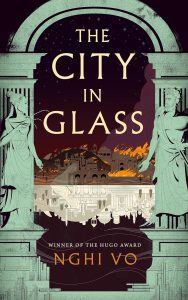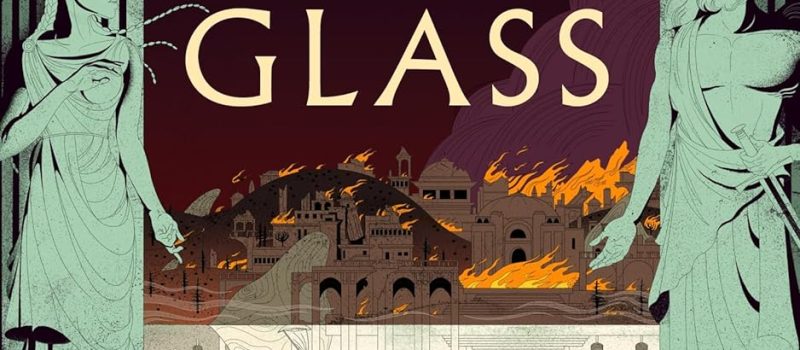The City in Glass by Nghi Vo: Review by Liz Bourke
 The City in Glass, Nghi Vo (Tordotcom 978-1-25037-682-4, 224pp, $24.99, hc) October 2024.
The City in Glass, Nghi Vo (Tordotcom 978-1-25037-682-4, 224pp, $24.99, hc) October 2024.
Nghi Vo has a Hugo Award and a Crawford Award to her credit for The Empress of Salt and Fortune, the opening novella in the Singing Hills Cycle, as well as an Ignyte for Into the Riverlands. The City in Glass, her latest work – a short novel – is unrelated to her other previous novels and novellas. It is the story of a demon, a city, its destruction and rebirth, and one of the angels that smote it down to the stones and suffered the demon’s curse in the aftermath. They are bound together, and to the ruins of the city where a city may grow again. They are each other’s natural enemies, but a mutual fascination – something more complex than hate, or love, or grief, or desire, but carrying some part of each – brings them together. This is not a love story, except sideways and slantwise. Not a love story, but a story about love, and grief, and hate, and change.
The demon Vitrine loves the city of Azril. Immortal, inhuman, powerful but not omnipotent, she has helped it grow to a dazzling centre of culture and art, vibrant and thriving, full of revelry and intrigue, riots and desires, dancing and knowledge. She has aided her favourites, pruned where she thought best, and made choices always with an eye to the more interesting outcome. Azril is hers, and so are its people, and she ‘‘loved her city like demons and cats may love things, with an eye towards ownership and the threat of small mayhem.’’
Then the angels come, unknowable, implacable, and unstoppable. They smite Azril with fire, and all its people with it, for no knowable reason. Vitrine’s grief-stricken rage damages one of the angels, but that is all she can do, and that curse will connect them down the years to come. She is left amid the mud and corpses of a city destroyed almost to its foundations, and the long slow task of burying the dead, mourning the lost, and remaking the ruins into something that can live again.
We learn fragments of Vitrine’s past, snapshots of Azril-as-it-was, the vibrant depths of her love and her grief, her encounters with the angel in the ruins of the city and the tentative beginnings of a new Azril. Vitrine is not human, and Vo uses Vitrine’s subtly alien nature to examine the alienation of grief, the devastation of loss, and the enduring processes that come in its aftermath, of rebuilding and recovery. Vitrine’s hatred for the angel who represents the destruction of all she’s loved is transmuted into something more complex: They change each other, through time and proximity, though the angel – that instrument of destruction – is, it seems, much more profoundly changed.
It is possible, I think, to read The City in Glass primarily as a metaphor for, or an argument about, personal and intimate losses, interpersonal relationships, the illusion of control. (I realise, saying this, that I’m making it sound so serious. It’s also leavened with humour and a sense of the ridiculous, in addition to its gorgeous prose and vivid imagery.)
But on some level it is also an argument about living with – and building unapologetically joyful, riotous, self-willed lives in defiance of – the inimical decisions of destructive powers: untouchable powers that are far away until suddenly, unexpectedly, they’re right up close and killing your neighbours. Vitrine comes to Azril first as a refugee from the war that destroyed her previous home and all its inhabitants, save those who fled. The angels’ devastation of Azril strikes with the suddenness of a tidal wave or a nuclear blast, as fatally unreasonable to the inhabitants as a missile strike on a children’s hospital or a refugee encampment. The war that comes to a rebuilt Azril in The City in Glass’s closing pages comes with no more reason than war ever comes, and brings yet more pointless destruction in its wake: the wreckage of an observatory, the ruin of a library, the death of children. In as much as it is a love story, it’s a story about destruction and endurance, and it feels like a commentary on the nature of survival, resilience, grief and love.
Love and sacrifice and change run together at the close. The City in Glass is less a story in the classic mode than an emotional journey told in crisply beautiful prose, a meditation in vivid snapshots and stark images: a character study of a city and Vitrine, its quasi-genius loci. It’s arrestingly gorgeous. I need to read everything else that Vo’s ever written as soon as possible.
Interested in this title? Your purchase through the links below brings us a small amount of affiliate income and helps us keep doing all the reviews you love to read!
Liz Bourke is a cranky queer person who reads books. She holds a Ph.D in Classics from Trinity College, Dublin. Her first book, Sleeping With Monsters, a collection of reviews and criticism, is out now from Aqueduct Press. Find her at her blog, her Patreon, or Twitter. She supports the work of the Irish Refugee Council and the Abortion Rights Campaign.
This review and more like it in the October 2024 issue of Locus
 While you are here, please take a moment to support Locus with a one-time or recurring donation. We rely on reader donations to keep the magazine and site going, and would like to keep the site paywall free, but WE NEED YOUR FINANCIAL SUPPORT to continue quality coverage of the science fiction and fantasy field.
While you are here, please take a moment to support Locus with a one-time or recurring donation. We rely on reader donations to keep the magazine and site going, and would like to keep the site paywall free, but WE NEED YOUR FINANCIAL SUPPORT to continue quality coverage of the science fiction and fantasy field.
©Locus Magazine. Copyrighted material may not be republished without permission of LSFF.










